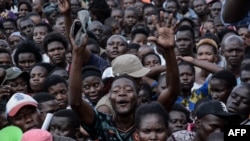Kenyatta's preferred successor, veteran opposition leader Raila Odinga, has pledged to renegotiate terms for the debt to lengthen its maturity and free up cash to fund social interventions and development.
His main opponent, Kenyatta's estranged deputy president William Ruto, says he would reduce borrowing and stimulate small enterprises to help drive growth and generate revenues.
But surging living costs, which many Kenyans blame on corruption, are uppermost in voters' minds.
"Parents with children in school are suffering a lot. Food prices are also hurting them," said Steve Otiende, a small shop owner in Nairobi.
The government has spent 12.6 billion shillings providing food for hunger-stricken communities, but says it needs more.
"The persistent drought has left us with a resource gap of more than 15 billion shillings required for interventions," said Margaret Kobia, the minister in charge of special programs.
Like other developing economies, Kenya's troubles have been compounded by stress in global markets, as major central banks start to reverse years of cheap money policies.
Kenya's international bonds have lost 29% of their value this year, with only Ghana's faring worse in Africa.
Market turmoil forced Kenya to abandon a $1 billion bond sale last month. The government is examining alternative financing and spending cuts, Muia at the finance ministry said.
But the risk premium over U.S. Treasuries paid by Kenya's debt is now over the 1,000 basis points traditionally seen as a marker of distress.
Investor confidence could be shaken further by the election: two of the last three presidential polls were marred by violence, with 1,200 people killed in post-election clashes in 2007.
"It is very much unclear if the economy has the resilience to manage the coming quarters without crisis," said Matthew Vogel, a London-based fund manager at FIM Partners, which specializes in frontier markets.
